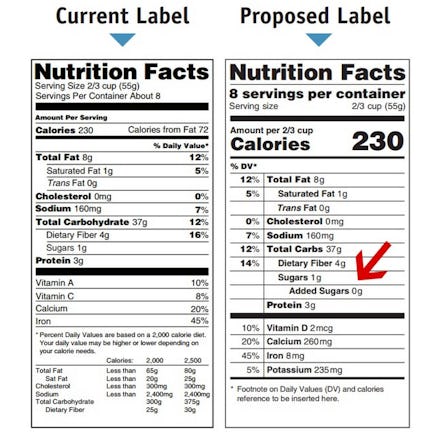Food Companies Are Doing Everything to Keep This One New Line Off of Nutrition Labels

Twelve letters have ignited a heated debate between Big Sugar and the Food and Drug Administration (FDA).
Image Credit: The Washington Post
At a public meeting between the two groups, the president of the Sugar Association, Andrew Briscoe, said, "There is no preponderance of evidence to justify an added sugar label."
Actually, there's plenty. The rising consumption of sugar, particularly in sugary drinks, has been directly linked to the obesity epidemic in the United States, according to scientists at the Harvard School of Public Health, the University of California San Francisco and Indiana University. In a global study of the high levels of obesity, researchers found that in countries where people had greater access to sugar, rates of diabetes went up by about 1% for every 150 calories of sugar available for each person each day (that's about the same amount that a bag of mini Oreos or a can of Coke contains). And people who consume just one or two cans a day of soda or fruit juice have a 26% greater risk of developing type 2 diabetes than those who don't.
The amount of sugar that Americans eat is on the rise. While we consumed about 110 pounds of the sweet stuff each year in 1950, that number shot up to 152 pounds in 2000.
Image Credit: Whole Health Source
Industry groups, from the Corn Refiners Association, to the American Beverage Association, have been sneaking sugar into their products under pseudonyms like diastatic malt and dextrose for years. They're afraid that labeling it outright could put them out of business. They might be on to something there.
Remember trans-fat? Exactly.
After the FDA pushed companies who include the artery-clogging fats in their products to indicate them on nutrition labels in 2006, the ingredient virtually disappeared from grocery store shelves. Even the all-American Girl Scout Cookie went virtually trans-fat free in 2007.
The sugar industry is desperately trying to avoid a similar death, from writing letters begging the FDA to delay the new rule, to claiming there's no science to support the idea that it's terrible for you.
Other groups, including the Union of Concerned Scientists and a smaller organization led by attorney Bill Marler, who works on food safety, have the FDA's back. We'll see what happens next.